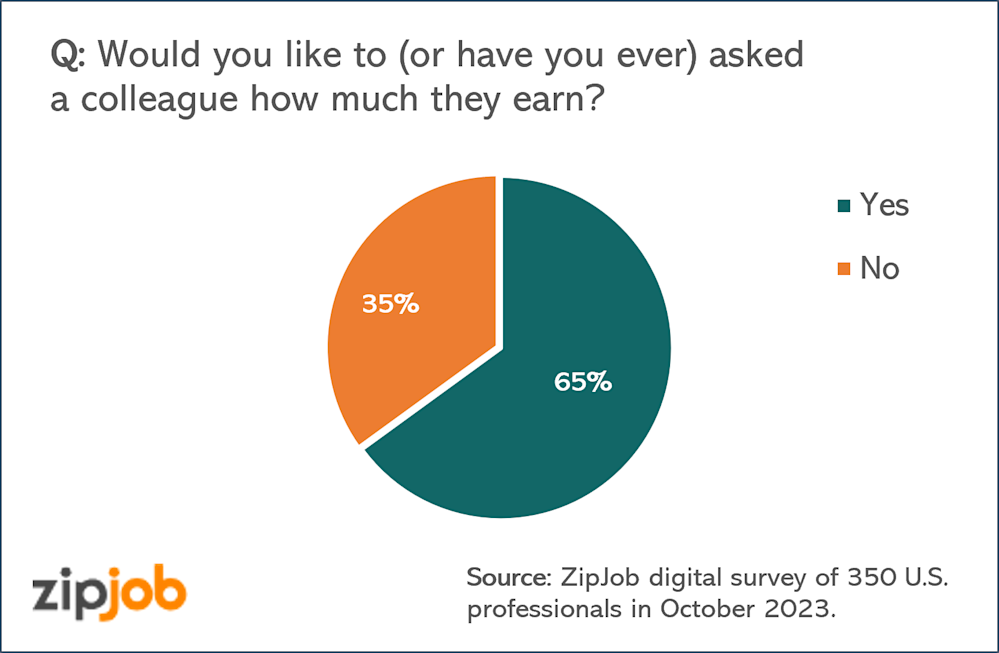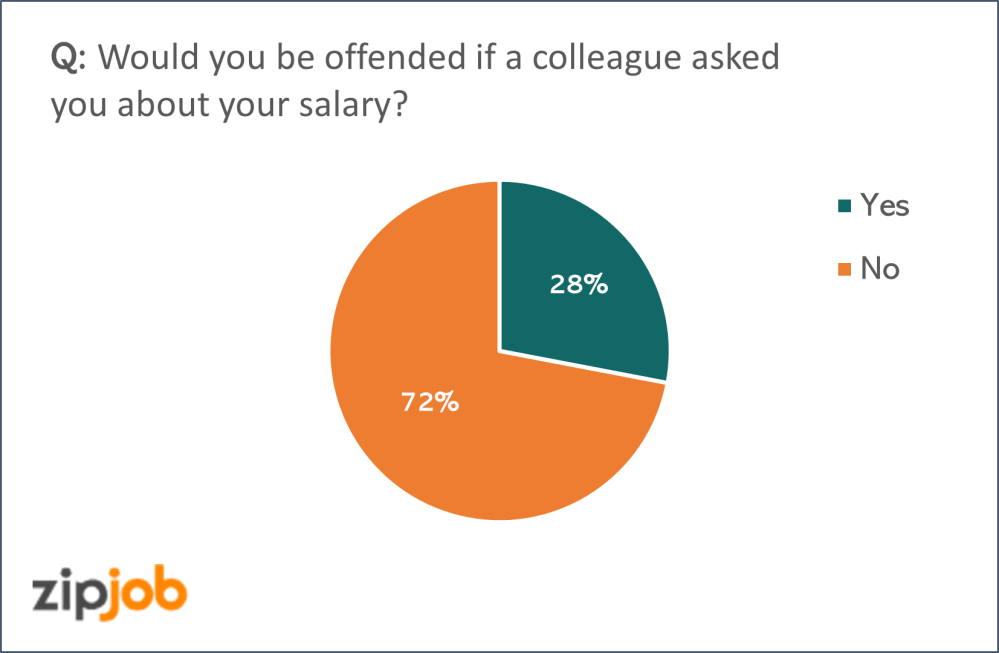Should you share your salary with coworkers?

Consider the pros and cons and how it may impact your career
New research reveals workers’ willingness to share their salary information — and how to decide if you should do the same.
In today's workforce, salary transparency has become an increasingly hot topic. Understandably, career-driven professionals want to know how their pay measures up against their peers in similar roles, and whether there are any wage disparities between genders or ethnicities.
Similarly, employers are acknowledging the value of such transparency in the workplace to promote openness and fairness in compensation practices, reduce wage gaps, and foster a corporate culture of trust and equity.
“In this post-pandemic world, there's a cultural shift toward more vulnerability and openness in various aspects of life, especially in the workplace,” says ZipJob career expert, Amanda Augustine. “Millennials and younger generations, in particular, often prioritize transparency and value workplaces that are forthcoming about policies, practices, and compensation.”
Here at ZipJob, we wanted to learn how professionals truly feel about salary transparency and if they would be comfortable sharing their personal salary details with their colleagues.
But, before we delve into the data, let’s take a closer look at what salary transparency is and what it means for job seekers and employees.
What is salary transparency?
Salary transparency, also referred to as compensation transparency or pay transparency, is the practice of openly communicating salary information with employees and job candidates. This communication can occur in many forms, from making individual employees’ salaries publicly available, to providing details about salary structure and pay scales within a company. Some organizations may publish salary bands for different job roles, while others may provide a detailed breakdown of how salaries are determined, taking into account factors such as experience, skills, and performance.
Over the past few years, an increasing number of U.S. states have passed, or are considering passing, salary transparency laws as one measure to help close the gender pay gap. Earlier this year, two laws were introduced in Congress – the Salary Transparency Act and the Pay Equity for All Act. If both laws pass, all U.S. employers would be required to disclose wage ranges associated with all employment opportunities, as well as prohibit employers from asking job candidates about their salary histories.
While most salary transparency legislation focuses on what companies must do to make compensation information available, there are also ways for individuals to take matters into their own hands and promote transparency in their workplace. It starts by having open salary discussions with fellow colleagues.
Is salary transparency among coworkers fair or foul play?
As much as employees may publicly support the idea of salary transparency in the workplace, here at ZipJob, we wondered if they would truly be comfortable having such conversations with their coworkers. With this in mind, we decided to ask 350 career-minded U.S. professionals about their comfort level with sharing salary information among colleagues.
When asked, “Would you like to (or have you ever) asked a colleague how much they earn to see how your salary ranks?” 6 out of 10 (65%) admitted they are proponents of salary transparency in the workplace.

Given their high level of comfort regarding openness about their earnings, perhaps it’s unsurprising that when asked, “Would you be offended if a colleague asked you about your salary?,” less than one-third (28%) claimed they would be insulted if asked about their salary, perhaps reflecting the normalization of salary transparency.

Should you share your salary with colleagues?
Discussing your salary with your colleagues has its advantages and drawbacks. Experts are often split on the issue, with some advocating for salary transparency and others scoffing at the suggestion.
Before you decide whether or not to share salary information with your colleagues, Augustine recommends carefully considering the pros and cons of such a discussion:
Pros of discussing salary with coworkers
Transparency & Fairness: Salary discussions can promote transparency and fairness within the workplace. If you and your colleagues discover wage gaps, you have the unique opportunity to work together to address them. When everyone is aware of each other's compensation, the group may be more effective in negotiating collectively for better pay and benefits. For example, how did the cast of 'Friends' start earning $1 million per episode? The simple answer is that all six cast members negotiated together so that each one would be paid the same.
Negotiation Insights: Sharing salary information can provide insights into negotiation strategies. You and your colleagues can learn from each other's experiences, helping everyone negotiate better compensation packages in the future.
Empowerment: Discussing salaries with your colleagues can be empowering, as it can help you understand your current market value. This knowledge can be crucial during your next performance review or when you’re exploring new job opportunities.
Cons of discussing salary with coworkers
Workplace Discomfort: Salary discussions amongst colleagues may create an uncomfortable atmosphere at work, especially if you discover that one colleague earns more than their peers. This revelation can lead to jealousy, tension, and strained relationships within your department, which may harm your ability to work together and collaborate effectively.
Potential for Misunderstanding: Salary information might be inaccurate or incomplete. Without the full context of each of your colleague’s responsibilities, experience, and performance, comparisons amongst your team can lead to misunderstandings.
Company Policies: Some companies have policies against discussing salaries, and violating these policies could lead to disciplinary action. It's important to be aware of your company's view on this matter.
“It's important to consider the culture of your workplace, your company's policies, and your personal comfort level with sharing such information, before you decide to discuss salary with a coworker,” says Augustine. “When in doubt, consider speaking with someone in HR or seeking guidance from your manager.”
Tips for sharing salary information with coworkers
According to ZipJob’s latest survey, 65% of professionals would reveal their current salary if asked by a colleague. However, Augustine suggests the following tips for how, where, and when to discuss salary with a coworker:
Establish clear intentions. Chances are, if you approach a colleague to talk about salaries, they’ll want to know why you’re asking for such information in the first place. Be upfront and honest about your motivation for this conversation. Are you planning to negotiate a raise in the near future and you’re trying to determine how your pay compares to others in a similar role? Are you concerned there is a fundamental wage gap among genders (or other factors) at the company that you’d like to address? Whatever your reason, be prepared to share it with your coworker. Also, if a colleague doesn’t wish to share such sensitive information, respect their decision and leave it at that.
Choose the right time and place. If your co-worker is willing to share salary information, find a private, quiet location where the two of you can chat without fear of being overheard by others. Also, avoid having this conversation when either of you is super busy or feeling especially stressed, so both of you can remain professional and give one another your full attention.
Keep the conversation professional. Similar to a salary negotiation, it’s important to keep your emotions at bay when sharing salary information with coworkers. Remember, your goal is to gather facts about average salaries in your industry and position so you can more effectively negotiate with your boss or with a different employer altogether.
Summary
Be mindful that what you find comfortable or acceptable may be wildly different for your colleagues, so be considerate before sharing personal information with them.
Until legislation dictates otherwise, salary transparency among coworkers is a personal decision that depends on various factors. If you're uncertain about your company’s stance regarding workplace compensation practices, ask a trusted colleague or someone in your HR department.
Since workplace culture, company policies, and especially your own comfort level can all impact one’s views on this sensitive topic, tread carefully to help ensure you are maintaining professionalism — and your friendships — in the workplace.
Searching for a new position with a potential pay raise? Ensuring that your applications are relevant is the first step. Try out our tool for free resume reviews right now. We'll provide you with the tips you might have overlooked to make sure you impress recruiters. Don't miss this easy step if you want to expedite your job search.
